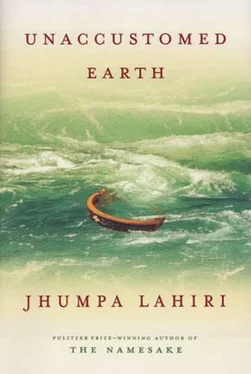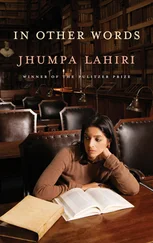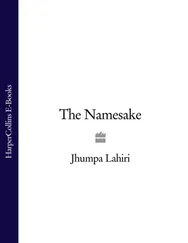To my knowledge the only person who'd ever occupied our guestroom was a nurse named Mrs. Gharibian, who had come to tend to my mother after her needs became too much for my father and me and before my mother decided that she wanted to die in the hospital and not at home. Mrs. Gharibian was a middle-aged woman with short brown hair and a soft Southern accent. She had married an Armenian and learned to make all sorts of snacks from her mother-in-law. She would bring Tupper-ware containers full of lamb turnovers and stuffed grape leaves, food that now reminds me of my mother dying, putting them in the refrigerator for my father and me to eat, also stocking the house with milk and bread without being asked. Normally she left in the evenings, but for two weeks she spent the nights with us, administering morphine injections and emptying the bedpans, making notes in a little cloth book that looked as if it ought to contain recipes. Something about her quietly optimistic manner made me believe that Mrs. Gharibian had the power to sustain my mother, not to cure her but to keep her alive indefinitely. "This is the worst part," she told me once. "You're holding your breath, thinking it's still ahead, but this really is the worst of it, for you and for her." At the time her words had not soothed me; I could imagine nothing worse than the moment my mother no longer drew air in and out of her lungs, no longer took us in through her weary eyes. I could imagine nothing worse than not being able to look at her face every day, its beauty grossly distorted but never abandoning her. But in the days after her death I realized Mrs. Gharibian had been right, there had been nothing worse than waiting for it to come, that the void that followed was easier to bear than the solid weight of those days.
I pulled on a sweater, cracked open the sliding door, lit a cigarette. The season's leaves had not been raked, were scattered everywhere and drifting in the breeze. The swimming pool had made my summer vacations from college tolerable, but last summer, which I'd spent house-sitting in Brooklyn with a friend whose parents had gone to Europe, my father had not bothered to fill it with water, and last night at dinner he mentioned that the filter needed to be replaced. Our first summer in the house my mother had used the pool religiously, forty lengths back and forth before breakfast. By the following summer, when she was weak from chemotherapy, she would only wade or dangle her legs on hot days, and at the end of that summer she died.
Inside, I could hear the television-as soon as I emerged from the guestroom I would have to see them. I put on my jeans, annoyed that I could not simply walk through the house in boxers. In the bathroom I brushed my teeth and took the time to shave. I craved coffee but not food. Dinner had been another embarrassment of riches. Chitra hovered over my father and me and the girls, eating privately after we were done, the way our maids would in Bombay. I imagined another crowded plate waiting for me on the dining table, but there was no breakfast prepared, nothing offered when I approached Chitra and her daughters in the living room. They were sitting with their feet up on the sectional, watching an episode of
Family Feud. They were dwarfed by the soaring ceiling, washed out by the morning sun the room received. The girls were dressed, but Chitra was wearing a zippered housecoat in a frumpy red-and-yellow calico print. Without makeup or jewelry she looked even younger. She was drinking a cup of tea, my mother's biscuit tin open beside her. "Good morning," I said.
"Good morning," Piu and Rupa chimed back, their eyes quickly returning to the television.
"I'll get your tea," Chitra said, putting her cup on the cocktail table and preparing to get up. "I didn't make any for you. Your father told me you like to sleep late when you visit home."
"It's okay," I told her. "Don't get up. I don't need any."
She spoke to me in Bengali, I to her in English, as had been the case the night before. I thought that my slack Americanized pronunciation would be lost on her, but she seemed to follow what I said.
Chitra frowned, confused. "No tea in the morning?" The girls also looked away from the television, waiting for my answer.
"I need coffee. It's what I have at school. I'm used to it now."
"But there is no coffee in the kitchen. Not that I have seen."
"Don't worry about it. I'll grab some at Dunkin' Donuts." Before she had the chance to ask, I continued, "It's a place that sells donuts. Donuts are a kind of cake, with a hole in the center."
"The store is far?"
"Just a few minutes."
"But you must take the car?"
I nodded, and she looked disappointed. "Without a car there is nowhere to go?"
"Not really. Can you drive?" She shook her head.
"It's not hard. I'm sure you could get a license."
"Oh, no," she said, not as if she were incapable, but as if driving were beneath her. "I would not like to learn."
"I'll be back in a while," I said. I noticed that the girls were looking up at me and I hesitated. "Would you like to come along?"
"Yes, please," Rupa and Piu said at the same time. They looked at Chitra, and she nodded in assent.
I went back to the guestroom to get my wallet and keys, and when I returned the girls were already in their coats, matching red parkas that my father must have bought for them after they arrived. The thick zippers and bright nylon shells of the coats transformed their appearance, suddenly lending them a legitimately American air. They sat together in the back of my car among the newspapers, empty soda bottles, course books, cassette tapes. "Sorry for the mess," I said, tossing everything off the seat and onto the floor. They fastened their seat belts carefully, prying one of the buckles out of its gap, Rupa helping Piu. Chitra stood in her housecoat looking through the storm door. She was trusting me to take her children to a place she'd never heard of and would not be able to find. Still, she waved and forced a small smile. I stepped on the clutch, about to reverse the car, when Chitra opened the storm door, poking her head out. "And I will be all right?"
"What do you mean?"
"I will be safe alone, in this house?"
"Of course," I said, stunned that it would be the first time, nearly laughing at her. "Enjoy it."
"She does not allow us to go outside," Piu said. "Not without her."
"She is afraid because she cannot see neighbors," Rupa added.
"And that we will fall into the swimming pool."
I did not know how to respond to any of this, so I said nothing as I backed out of the long driveway and drove toward town. The closest Dunkin' Donuts was less than fifteen minutes away, and when I approached it felt too soon. I wanted to continue driving, and so I kept going, heading toward the next town, where there was a beach my mother used to like for an occasional change of scenery. This required getting on the highway, and I found it satisfying, accelerating for a short while along the empty, impersonal road. The girls asked no questions about where we were going, each looking steadily out the back windows, the journey still brief enough that the lack of conversation did not feel strange. I entered the next town and took a road from which the gray line of the ocean was visible. I pointed this out to Rupa and Piu, but they said nothing. "We can either go into the drive-through or inside," I said once we reached the donut shop. "You guys have a preference?" "Which way is best?" Rupa asked.
"With the drive-through I get my coffee and drink it as we go back to the house. The other way, we sit inside."
Rupa voted for the drive-through, Piu to go inside. "Tell you what," I said. "We'll go in, and on our way home I'll get a refill in the drive-through."
They seemed pleased that neither option would be denied to them and got out of the car, holding hands as they walked across the parking lot. The Dunkin' Donuts was part of a shopping plaza with a liquor store, a Bed and Bath, and a place that sold party supplies. The lot was crammed with the cars of last-minute Christmas shoppers, but Dunkin' Donuts was empty. Christmas carols played on the sound system, their trite melodies foreign to Rupa and Piu. I ordered my coffee and asked the girls what they wanted. They stared at the selections, Piu straining on tiptoe, Rupa with her mouth slightly open and her tongue planted in one corner of it. The decent thing to do was to lift Piu up so that she could get a better view, and when I offered, she raised her hands and came into my arms. She was heavier than I expected, and I placed her on the counter, where she continued to stare.
Читать дальше












